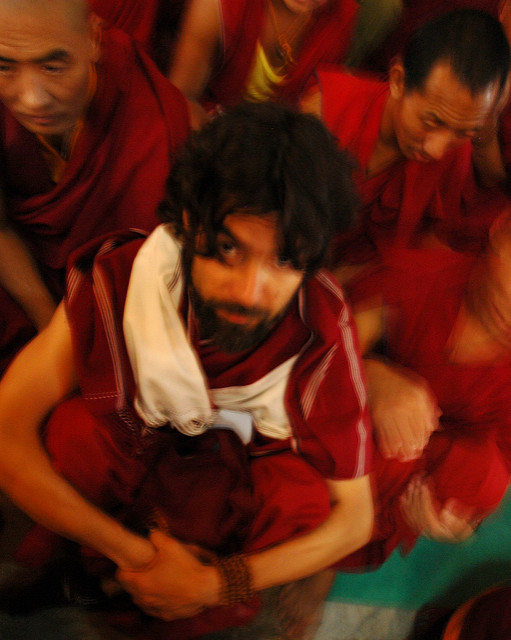Exploring the world of Buddhism can be an exciting journey for anyone who wishes to discover personal spirituality.
My own journey has been an exceptional ride into self-discovery, yet there have been challenges along the way. Despite the resources that are available, the Buddhist faith is still not widely accepted in the West. Because of this, one may want to first explore every avenue within the belief system, before making any drastic decisions to change. Too often, people jump onto the bandwagon of transformation without really understanding what they are getting into. Faith is a personal excursion that should be experienced by every practitioner in a unique way, and shouldn’t be swayed by popular culture. Let’s take a look at how Buddhism has found itself in the middle of American culture, and why one shouldn’t be swayed by the opinion of fad trends.
While many Americans tend to fall into the agnostic spectrum, many others are turning their attention to eastern religious fundamentals in order to meet their growing spiritual needs. This phenomena isn’t something new. We can track this search for religious ideology all the way back to the sixties, when the Beatles jumped onto the bandwagon and Transcendental Meditation hit the scene. Others, like Alan Watts, helped to further spread the message by introducing an entire generation to the Zen Buddhist philosophy. Since the sixties, the ideas of the East have steadily grown in popularity, coming to a head in modern pop culture. Today we find that Buddhism and other eastern religious ideas are growing exponentially in the West due to coverage by celebrities and other media outlets. Yet despite the coverage, the journey into Buddhism is never an easy one and all avenues should be explored before jumping off your current proverbial ship. Below in this Buddhist countdown, you will discover why Buddhism is in vogue in western countries and some reasons you might not want to join the ranks of religious converts.
Number 5: Celebrity coverage.
In my honest opinion, this might be the number one reason that Buddhism has grown so quickly in American culture, but I’m going to give humanity a little credit and place it at the bottom of the list. The public loves their celebrities, and many folks try desperately to emulate and copy their favorites. Don’t believe me? Just look at the magazine rack the next time you check out at your local grocery store. The tabloids are brimming with the latest celebrity gossip and love affairs. We have become a culture that loves drama and idolizes the wild life of celebrity perpetrators. We worship reality television, and try desperately to become what we see. It’s no wonder, then, that many celebrities have influenced the spirituality of this country.
Former Pretty Woman front man, Richard Gear, has spearheaded the campaign and has helped spread the ideas of Tibetan Buddhism. Mr. Gear has even become close to the man in charge himself, the Dalai Lama. Gear has narrated more than one documentary on the philosophy of Buddhism, and released a PBS special about the life of the Buddha. Other stars such as Tiger Woods, Orlando Bloom, Tina Turner, and many more have helped perpetuate the ideology of Buddhism, though with all the drama, it’s hard to believe that they follow any spiritual path at all.
Number 4: Spirituality has been dismissed by science.
Exploring the world of spirituality is by no means a new endeavor for humanity. Our cave-dwelling forefathers tried to make sense of the wonders that surrounded their daily lives. Objects and events that could not be explained with rudimentary logic were passed off as the work of some benevolent spirit residing just behind the fabric of reality. Over time, the need for a spiritual existence became something that is now ingrained into our very physiology. Scientists can literally watch a brain light up while the test subject is in a meditative state. Men of modern science (myself included) have done their best to explain away this phenomenon (spirituality) as the human need to understand the nature of reality and existence. Despite the technological leaps forward, the age old (and some would say outdated) view of other-worldliness is still a deep running idea in almost every major culture around the world.
The world has become a place that can be explained by a few waves of the scientific method. Staying true to our outlaw heritage, we have responded by searching for the very thing that science claims does not exist. People have started the search to find a religious idea that not only fits in with modern scientific views, but also breaks away from the norms of classical spirituality. People like to think of themselves as trend setters, and that extends into the realm of religious ideology. Despite the innovation of modern science, more and more people are starting to realize that there is just something missing from their lives. It’s like a void within us all, just waiting to be filled with something greater than what we experience in everyday life.
Number 3: People see Christianity as “outdated” and “bigoted”
We live in a country to which religious freedom is supposed to dominate the hierarchy of values, yet faith-based bigotry runs rampant in many parts of our society. Anyone who has separated themselves from Judeo-Christian values can vouch for that fact, myself included. Judaic ideology has set the standard for legal and ethical behavior throughout American culture, and do not leave much room for others who may cling to a different set of moral values. One could say that ethical ideology is universal, and, while that may in fact be true, there is still heavy discrimination among those of us who do not share the same faith. While these struggles are certainly not limited to the U.S., I feel that we should be the front runners of religious acceptance, for the simple fact that our first few amendments are supposed to guarantee that right to every citizen.
As a Buddhist living in a conservative Christian community, I hid my religious philosophy for many years simply out of fear that I might be ridiculed or blacklisted on the social level. Being a teacher in this small town made things even worse for my situation. I was stuck with a moral dilemma; keep my faith a private matter, and lie every time someone asked, or risk being excommunicated from the community at large. Rather than taking this risk, I continued to hide my beliefs from all but those who were closest to me. There are still strong religious ideas in this country, and Christianity is still the king of spiritual philosophy.
Number 2: Meditation
If you’ve ever listened to a late Beatles song, one can hear the influence of eastern culture in the very music itself. Sixties pop culture did a fantastic job of bringing the idea of meditation to the attention of many Americans. Transcendental meditation is a practice followed to this very day, and despite the fact that this is a Hindu tradition, it has helped to propel the Buddhist philosophy forward. We live in a world where nothing ever slows down. Regardless of our situation, almost everyone has what might be called a full plate. Between careers, family, friends, and other obligations it’s hard to find the time to just relax. We push ourselves harder and harder each day in the hopes that we will eventually reach the top of the ladder. Society has fooled us into believing the harder we work, the further we go, and because of this people have started looking for an outlet to escape.
Meditation has become a norm in almost every facet of our modern world. People trying to find that illustrious escape from the hustle and bustle of the daily grind have turned their attention to the idea of meditation. Not only is meditation a escape from our lives, it has been proven to benefit the health of those who practice. Seeing all the benefits, it’s no wonder that people have taken this idea to the next level and adopted Buddhism. There have been thousands of studies dedicated to the health benefits of differing types of meditation. One study claims that the visualization of Tibetan Buddhists has the greatest benefits to the welfare of the mind. These benefits include increased happiness, heightened immune response, a decrease in depressive symptoms, and much more. With all of the positive attributes that meditation can give, it’s surprising that Buddhism hasn’t grown faster than what it already has.
Number 1: Americans are looking for an alternative that makes sense.
I believe that we are in the midst of a cultural revolution. People are tired of the same thing served over and over again. We look at the conservatives in this country and our minds automatically move to the stereotype of rich, white, Christian males. Americans are fighting back against this archetype by exploring new venues within the faith spectrum. Many people have a hard time swallowing the idea of an all-knowing God that sits in the clouds looking down at humanity. Because of this, the public is trying desperately to find something that they believe makes sense. Many claim that Buddhism is the only religion on the planet that fits in with the ideas of modern science. It’s a religion based on causality, where nothing exists independently of anything else. This gives our modern brains a sense of unity with everything and everyone around us. It’s a religion that claims to help people become empathetic, relaxed, caring individuals. There’s also a lack of a creator deity which seems to mesh better with the minds of those who find having faith in God to be difficult.
Despite the reasons Buddhist philosophy is growing so rapidly in this country, it’s nice to see that people are turning to an idea of peace. Too often in our world, we are exposed to sex, violence, and other atrocities via regular media outlets. Everywhere we turn we are exposed to more of the same. Faith and modern society seem to be in a tug-of-war match at the moment, and it will be interesting to see who comes out victorious. As Buddhism continues to make its mark on our world, more and more of its religious philosophy will make its way into the American cultural fabric. It will ultimately be on our shoulders to make the decision to change or to stay the same. Just be sure that the change is made for the right reasons.
~
Author: Derek Gladden
Editor: Jean Weiss
Photo: Wonderlane:Flickr







Read 0 comments and reply